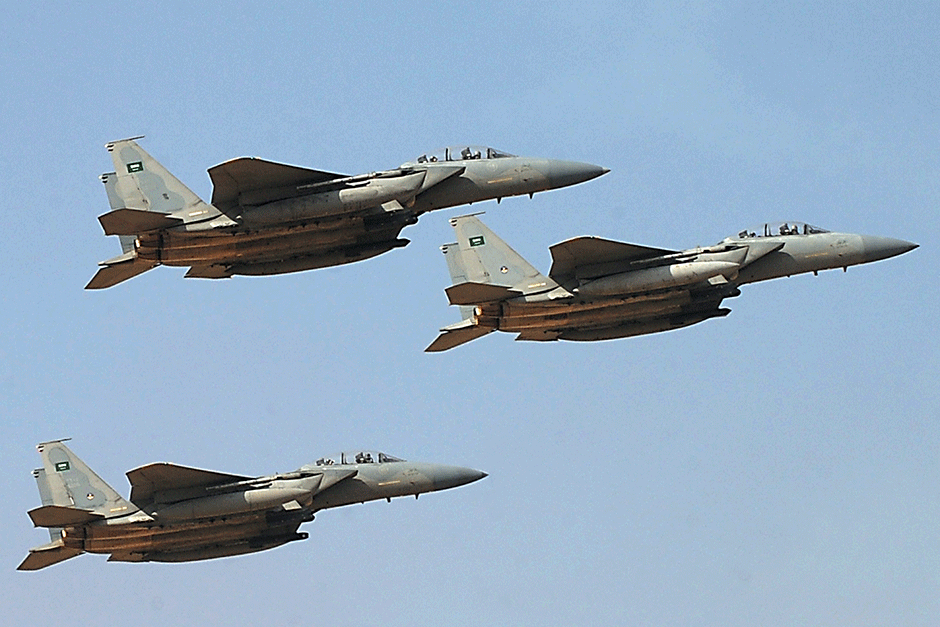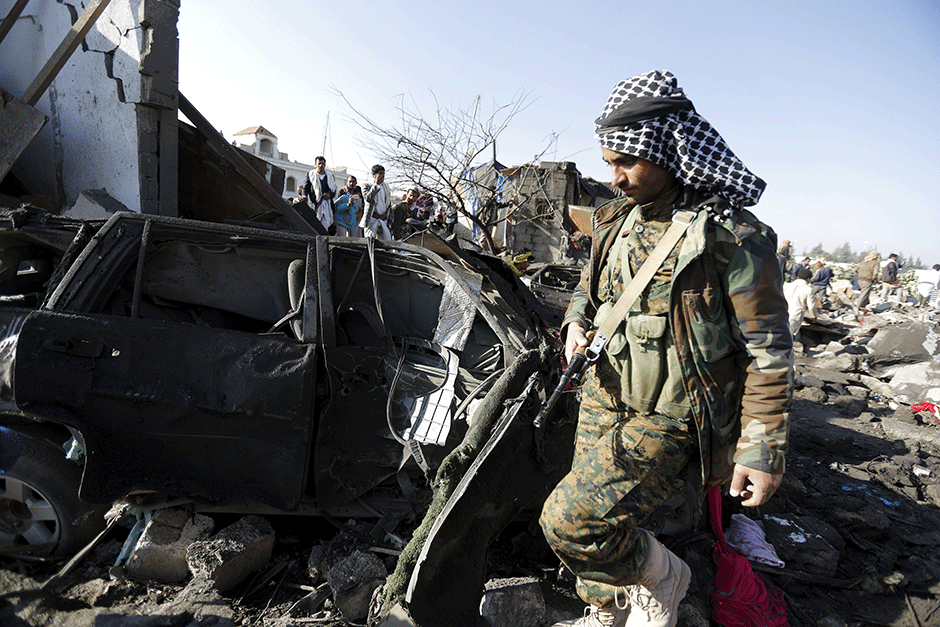
Sanaa: Arab coalition warplanes bombed rebel camps in Yemen Friday in a second straight day of strikes led by Saudi Arabia, which accused Iran of "aggression" across the region.
A months-long rebellion by Shiite fighters has escalated into a regional conflict that threatens to tear apart the impoverished state at the southern tip of the Arabian Peninsula.
Saudi Arabia has vowed to do "whatever it takes" to prevent the fall of its ally President Abedrabbo Mansour Hadi, accusing Iran of backing Al Houthi rebels' power grab.
At least 39 civilians have been killed in more than 24 hours of Saudi-led air strikes against Al Houthis, officials at the rebel-controlled health ministry in the capital said.
Twelve of the victims died when surrounding residential areas were hit in a raid against a military base north of the capital, the officials told AFP.
Presidential compound hit
At dawn on Friday, three air strikes hit the presidential compound in south Sanaa which the rebels seized last month, witnesses said.
They also bombed a Houthi-controlled army brigade in Amran province, north of the capital, and arms depots in the northern rebel stronghold of Saada, residents said.
The conflict has thrown up a major hurdle to Washington's longstanding drone war against Al-Qaeda militants who have exploited the power vacuum in Yemen since a 2011 uprising.
Hadi, backed by the West and Gulf Arab states, arrived in Riyadh on Thursday with officials saying he was on his way to Egypt to take part in a two-day Arab League summit at the weekend.
It was the first confirmation of his whereabouts since the rebels began advancing this week on the main southern city of Aden, where the president had been holed up since fleeing Sanaa last month.
Saudi Arabia says more than 10 countries, including four other Gulf states, have joined the anti-Houthi coalition.
'No longer safe'
As explosions rocked Sanaa, families streamed out of the capital seeking the relative safety of the provinces.
"I am leaving with my family. Sanaa is no longer safe," said one resident, who gave his name only as Mohammed, as he piled his belongings into a minibus.
An anti-aircraft missile wounded eight people, one of them seriously, when it exploded in a market in the capital on Friday, a day after it was fired by Houthi fighters, a security official said.
According to residents, dozens of vehicles carrying anti-aircraft missiles have been continuously circling the capital's neighbourhoods since the Saudi-led raids began.
The Saudi-owned Al-Arabiya television said the kingdom had deployed 100 fighter jets to the operation, while the United Arab Emirates had committed 30, Kuwait 15 each and Qatar 10. Bahrain said it had committed 12 fighters.
Saudi Arabia has reportedly also mobilised 150,000 troops near the border.
Trading accusations
The White House voiced concern about "reports of Iranian flow of arms into Yemen", while Riyadh lashed out at Tehran.
"The Iranians are the ones who are meddling in the affairs of the Arab countries whether it's in Lebanon, in Syria, in Iraq... in Yemen," the kingdom's ambassador to the United States, Adel al-Jubeir, told Fox News.
"We have to deal with Iran's aggression in the region. We're dealing with their support of the Houthis and the Houthis' attempt to take over in Yemen," he added.
Iran reacted furiously to the Saudi-led strikes, condemning the intervention as "a dangerous step" that violated "international responsibilities and national sovereignty".
Former president Ali Abdullah Saleh, who resigned in 2012 following a year of nationwide protests, is accused of allying with the rebels, relying on the loyalty of many army units that he built during his three-decade rule.
Dozens of people have been killed as the Houthis, backed by troops allied with Saleh, clashed with pro-Hadi forces in their drive southwards after launching a power takeover in Sanaa in February.
The Saudi-led intervention triggered a sharp rise in world oil prices on fears the conflict could threaten supplies. Riyadh said it was boosting security on its borders and across the kingdom, including at the OPEC kingpin's crucial oil facilities.
Washington said President Barack Obama had authorised the "provision of logistical and intelligence support" for the campaign, while Egypt, Jordan, Morocco and Sudan said they were joining it.
But Iraq said it opposed the Saudi-led intervention, calling for a peaceful settlement. Lebanese movement Hezbollah accused Riyadh of "aggression".
Washington insisted the intervention would have "no impact" on nuclear talks with Tehran, as last-ditch efforts to reach a deal before a Tuesday deadline were made in Switzerland.













